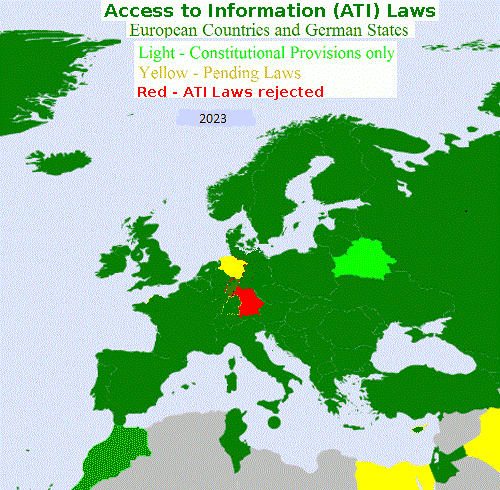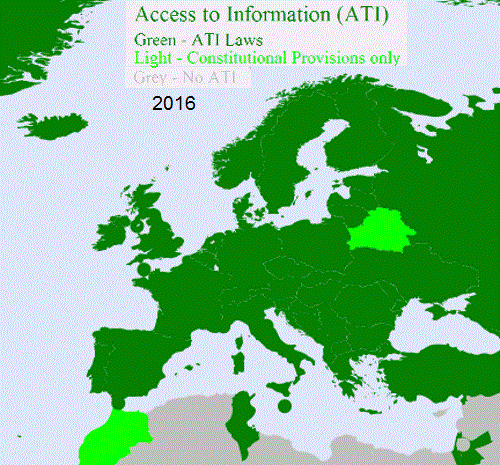

Ähnlicher Stoff auf Deutsch: http://wkeim.bplaced.net/files/de_menschenrechte.htm
Walter Keim, E-mail: walter.keim@gmail.com
Torshaugv. 2 C
N-7020 Trondheim, 21. November 2006
Commissioner for Human Rights
of the Council of Europe
Thomas Hammarberg
Council of Europe
F-67075 STRASBOURG CEDEX
Dear Mr. Hammarberg,
I refer to your visit in Germany in October 2006 and the information about structural and recurring problems I send 18. November 2003, receipt confirmed 28. November 2003 by the Private Secretary to the Commissioner for Human Rights. Since then there was some progress.
In the Germany federation a Freedom of Information law had been promised since 1998. The president of the German Bundestag send my petition suggesting ATI to chancellor Schröder 22. December 2004, to be taken into account. The coalition parties have 2004 proposed a law for federal agencies which was approved by the Senate (Bundesrat) 8. July 2005. However international standards based on the principle of maximum disclosure where not reached.
A handful MPs, a handful NGOs, a handful journalists, 4 freedom of information commissioners and some other individuals fought for a federal law. But the press was nearly not interested and the public not informed. Therefore bureaucracy could block the law for 7 years and weaken access.
I autumn 2005 I wrote a petition to 12 German states without FOI laws. 4 German states i. e. Bremen, Hamburg, Mecklenburg-Western Pomerania and Saarland adopted FOI laws in 2006.
However Germany remains in 8 of 16 states up to now the only major country in EU, Europe, OSCE, OECD and developed civilized countries without Freedom of Information. Therefore approx. 60 % of the population in Germany lack Freedom of Information in communities, counties and local states.
Unfortunately the German states Bremen, Mecklenburg-Pomerania and Saarland gave FOI laws with a time limit, i.e. this human right ceases after 5 to 6 years.
Problems with access to information are only the top of the iceberg: With few exceptions citizens lack the right to a fair answer within reasonable time at all levels meeting authorities. It is no coincidence that Germany is the only country in Europe, which reserved the right not to comply with CoE Recommendation (85) 13 of appointing an independent Ombudsman. The ombudsman was recommended the general competence, to the human rights matters under his scrutiny and, if not incompatible with national legislation, to initiate investigations and to give opinions when questions of human rights are involved. The committee of petitions of the Bundestag is listed under national Ombudsman in International Ombudsman Institute but does not show up in meetings (e.g. 5 – 6 April 2002 in Vilnius, Lithuania)
The German Institute of Human Rights (Deutsche Institut für Menschenrechte) was founded on the basis of suggestions of the UN Resolution 48/134 and CoE Recommendation No. R (97) 14. The first director Percy MacLean (now again judge at the Verwaltungsgericht Berlin) had to resign, because he monitored human rights in Germany (how UN and CoE wished). His opponents favoured to monitor international developments. (See his article: Human rights official quits: Percy MacLean clashed with institute's board over his focus on abuses in Germany, Appendix 1). I have asked for access to these documents arguing I need access to strengthen my knowledge for this complaint. I am afraid UN/CoE have to make an effort, because up to now access is denied. I perceive this as a scandal and have therefore informed both the press, NGOs and half of the members of the federal parliament. Nothing happened: Is this considered "normal" in the human rights phobic atmosphere in Germany?
Therefore I did my own investigation of human rights "Freedom of Opinion, Information, Association and Right to Fair Trial" basically based on judgements of the European Court of Human Rights, which I published on my private website. This became my most popular page :-) However no official authority has ever given an answer.
President
of the European Court for Human Rights puts Germany on notice (8.
Dec. 2006, AFP Agence France-Presse):
The president of the European Court for human rights (ECHR),
Luzius Wildhaber, admonished Germany for the conversion of the
Strassburger judgements: Germany has to be more concerned with
implementation of "the system of the human rights
convention”, said Wildhaber in an interview with press
agency AFP. There is obviously ignorance and “some knowledge
gaps”, also under German judges, stressed the 69-year old
Swiss court president, who will leave the Strassburger Court next
January because of age reasons.
I appreciate that OSCE, PACE, the International Helsinki Federation for Human Rights, FOIAdvocates, Access Info Europe, ARTICLE 19 und die Open Society Justice Initiative observe Germany. But I think that is not enough. Therefore I try to force progress by case Keim v. Germany ECHR Appl. No. 41126/05. Fortunately case Sdruženi Jihoceské Matky v. Czech Republic ECHR Decision 19101/03 and Application no. 11721/04. GERAGUYN KHORHURD PATGAMAVORAKAN AKUMB v. ARMENIA have recognized a human right of access to receive information.
I can see only a handful people in Germany writing about access to information as human right. Therefore international support is welcome.
Unfortunately my favourite lawyer Claus Plantiko for the ECHR case Keim v. Germany is threatened to loose his licence. Therefore I did a intervention. Lawyers who are critical to the human right violations in Germany can with help of a monopoly dating back to a law on legal advice from 1935 be fired from the bar, which means a Berufsverbot.
I could not find any report in the German press (e. g. overview by google news) about your visit and what you said and therefore I am curious to read your report in 2007.
Sincerely
Walter Keim
Copy: Percy MacLean, International Ombudsman Institute
[Walter Keim v. Germany] [Information to CoE] [Freedom of Information] [Human Rights in Germany] [Law on Legal Advice] [Petitions] [Back to Homepage]
Colours on picture: dark green: FOIA enacted. Yellow: pending law. FOIA= Freedom of Information Act